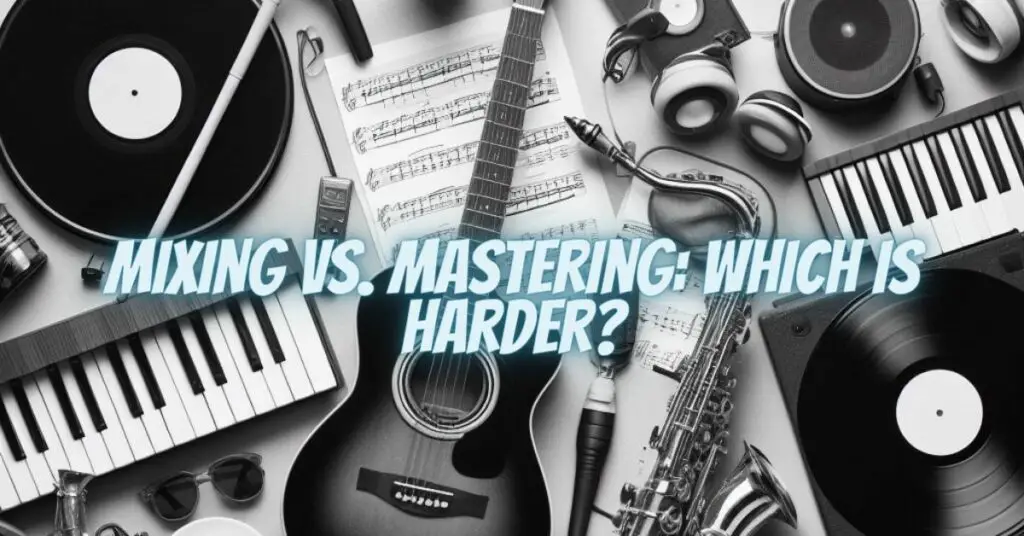Music production is a multifaceted art, involving several stages that each come with its own unique set of challenges. Two of the most critical phases in music production are mixing and mastering. Both mixing and mastering require specific skills and expertise, but they differ in their roles and complexities. In this article, we’ll explore the challenges of mixing and mastering, helping you understand which might be considered harder, depending on your perspective and experience.
Mixing: The Art of Balancing
Mixing is the process of combining and balancing individual audio tracks to create a cohesive and harmonious blend. The mixing engineer’s role is to shape the individual sounds, apply effects, and create a final stereo mix. Here are some of the challenges in mixing:
- Balancing Act: Mixing requires an acute sense of balance. You need to ensure that each instrument and vocal sits in its own space within the stereo field, with the appropriate volume levels and EQ adjustments. Achieving this balance can be intricate, especially in complex arrangements.
- EQ and Frequency Management: Mastering the art of equalization (EQ) to shape the tonal characteristics of each track and avoid frequency conflicts is a significant challenge in mixing. Clearing up muddiness and achieving clarity takes practice and a trained ear.
- Dynamic Range: Managing the dynamic range is crucial. You must ensure that the mix maintains appropriate dynamic contrast, making sure it’s neither too squashed and lifeless nor excessively dynamic.
- Creative Decisions: Mixing engineers often need to make creative decisions, such as applying effects, creating depth, and enhancing certain elements to fit the song’s artistic vision. This requires a keen musical sense.
- Client Expectations: Meeting the artist’s or producer’s vision can be challenging. Ensuring that the mix aligns with their expectations while maintaining sonic quality requires effective communication and collaboration.
Mastering: The Final Touch
Mastering, on the other hand, is the last step before music is ready for distribution. It focuses on the overall balance and polish of the mix. The mastering engineer’s role is to enhance the mix’s clarity, loudness, and consistency. Here are some of the challenges in mastering:
- Clarity and Loudness: Achieving a balance between loudness and clarity is a significant challenge in mastering. The mastering engineer must enhance the track’s loudness while avoiding distortion and maintaining audio transparency.
- Quality Control: Ensuring that the mix translates well across different playback systems and formats is essential. The mastering engineer must prepare the mix for various distribution platforms and check for any errors.
- Dynamic Processing: Applying the right amount of compression, limiting, and other dynamic processing is a delicate process. Overdoing it can result in a lifeless, overly compressed sound, while not applying enough can lead to an uneven mix.
- Sequencing and Flow: For albums or EPs, the sequencing and flow of the tracks are critical. The mastering engineer must ensure that the songs transition seamlessly and maintain a consistent tonal quality.
- Client Expectations: As in mixing, understanding and meeting the artist’s or producer’s expectations is essential. Effective communication and collaborative decision-making are crucial in mastering as well.
The question of whether mixing or mastering is harder largely depends on the individual’s experience, skills, and personal preferences. Mixing can be challenging due to the complexity of balancing multiple elements within a mix, while mastering presents its own difficulties, such as achieving the right balance between loudness and clarity.
Both mixing and mastering are integral to music production, and they complement each other to create a polished and competitive final product. Ultimately, both stages require a deep understanding of sound, a trained ear, and artistic sensibility. The decision of which is harder may vary from person to person, but recognizing the importance of both in the music production process is essential for achieving professional results.

